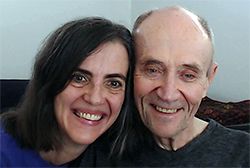Just One Look Forum Archives
Ways and Means
Quantitative studies are often used by our modern institutions to test the effectiveness of a treatment. They aim to show with statistical data how and if something is working. It has been done with mindfulness practice, and with significant results. The many 5-star reviews on Great Non-profits are indeed telling for the effectiveness of JOL, but we who have put reviews there are likely to be biased. There needs to be a control group to prove something statistically. But I wonder, what are some obstacles or hindrances for studying TJOLM using quantitative methods?
The first and so far only that comes to my mind is an ethical matter. Say that a study is designed using questionnaires. Two groups of volunteers get to rank different aspects of their well being, perhaps using similar questions as in previous studies. Then one group is encouraged to work with TJOLM, but the other is not. After a period of time all the respondents take the questionnaire again and the results can then be compared. But what about the control group who are not instructed to look at themselves and subsequently practice SDA? They will be left behind in such a scenario, and that doesn't sound right to me. Maybe it is OK if they are offered the same solution at the end of the study? Still not entirely good to my ears, but that may only be me.
And, ethics aside, I wonder what other issues could arise. I'm not a psychologist and have no training in how to study mental health. I may have overlooked the obvious... But what the heck, shouldn't it be straight forward to just copy a study from this field, but change the treatment to JOL/SDA?
I'd like to hear your thoughts about it, this could be a useful discussion. If JOL is statically proven effective in the field of mental health it may generate a whole lot of positive attention. I mean, TJOLM should be like a wet dream for every mental health professional out there, if it really works.
I've thought this too. Research is tricky and the design would have to be good. One of the pitfalls is how long it takes for the effects to become apparent. Most studies are over a matter of weeks or months. I would think a JOL study would have to take years complete fully....
good idea though.
Yes, in my mind the difficulty Jackx makes is the most obvious. Year long studies must have been made before, though? Would it require huge sums of money? The ethical issue is there, but it's a muddled one as we wouldn't "know" if it was effective until proven as such. But is a control group even necessary for a study of this kind? Controlled might be the gold standard but I think it would work even without one. Or another form of intervention could be provided for the control group, or even a comparative study weighing JOL against, say, mindfulness mentioned above. I have no idea how a good study is put together, but it's certainly seems worth the trouble.
Yes, it's a great idea roed! I agree with you about the control group thing and ethics. From my background I absolutely know testimonials are very powerful. They do become even more powerful when backed up by a trained professional. My idea right now is just to get people sharing about their experiences using the SDA to eliminate the soldiers of fear. I'll have to think more about your idea of Quantitative studies, and how that could be carried out. This is a fairly new development for John and Carla - implementing the SDA exercise this way I mean. So a lot of the testimonials are even from before the SDA exercise was established. I feel that what would be extremely powerful right now is to get as many people as possible sharing their positive experiences with the SDA exercise. The ones who are generally practicing it on a daily basis I mean. Just a report saying something along the lines of; 'I did the looking and then started a daily practice of SDA the way John and Carla outline.' After 2 years, I started to notice dramatic changes in my practical life. I was suffering a lot less. Things and situations that caused me suffering, just don't any more.' So that's what I'm speaking of. Then we could get a better idea of how the SDA exercise effects people and an approximate time frame as well. Like you said in the other post, perhaps establishing a time frame wouldn't work. Maybe one person gets benefits practicing the SDA after a few months, and, for another, it takes 2 years. But we'll only know that if people share. I just thought of my recent share on the survey thread. Where, now, after practicing the SDA for around 10 months, I can much more easily bring attention to my breath when disturbing thoughts arise. That alone has started to become helpful, so I consider it a milestone in my own development. Best, Lex

